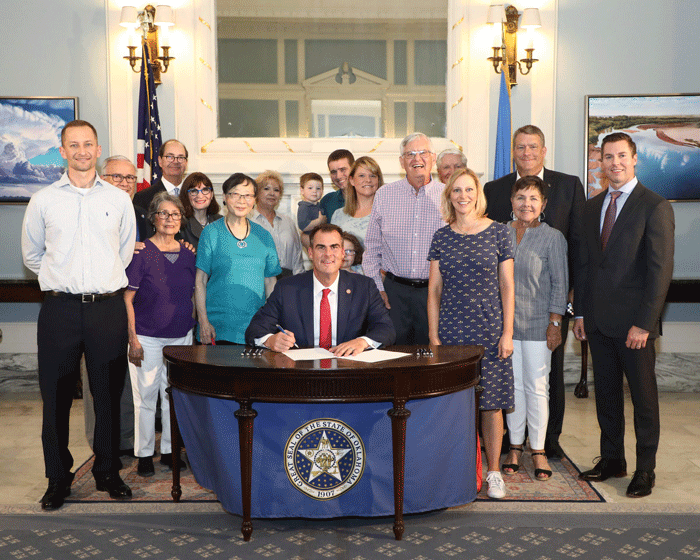
Beginning November 1, a new law takes effect to help Oklahoma women be better informed about a condition that can make breast cancer difficult to detect. A ceremonial signing of Senate Bill 443, known as Nancy’s Law, was recently held at the state Capitol. The legislation is named for Nancy Simpson, of Edmond, who died in 2018 just months after being diagnosed with stage four breast cancer despite being given a clean bill of health in all her mammograms done in previous years. No one involved in her care had ever explained that she should have received additional imaging because of her dense breast tissue, a common condition which can prevent mammograms from detecting cancer.
Sen. Adam Pugh, R-Edmond is the principal author of the measure, with House principal author, Rep. Lewis Moore, R-Arcadia. Under Oklahoma law, if a patient has dense breast tissue, she is to be notified about that condition and what additional testing she may undertake. SB 443 also requires mammography results and notification to be emailed to the patient if she requests it.
Her daughter, Elyzabeth Simpson said her family was stunned by the diagnosis because her mother had always been diligent in getting her yearly mammogram. She felt the system let her mother down but is hopeful Pugh’s legislation will better protect other Oklahoma women.
“We were all totally shocked that she could be diagnosed with stage four breast cancer when, you know, she’d gone every year and done the mammograms and everything the doctor had told her to do,” Simpson said. “I hope that this law will prevent other women from going through this situation and other families from losing a loved one.”
Pugh said Nancy Simpson reached out to him after her diagnosis. She passed away in December, before the session began, but the legislation received unanimous approval in both chambers.
“She knew her time was short, but she wanted to help other women get the information she never received—information that can mean the difference between life and death,” Pugh said. “It was truly a privilege to be able to author and pass this law to help save lives and also honor Nancy’s life.”
Nancy’s husband, John Simpson, said the legislation was a wonderful legacy.
“Everyone in our family, all our friends, everyone we talk to, they all say the same thing—how wonderful. What a legacy for what she had to go through,” Simpson said. “She was a beacon of light—the sweetest smile. Everyone loved her.”